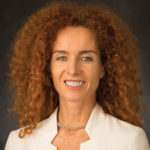2016 Leaders in Higher Education
THIS GUIDE IS NO LONGER ACTIVE. For the current FP Guide, click here.
New York University School of Professional Studies, Center for Global Affairs
Forward-Thinking and Innovative
As clinical associate professor and academic director of the MS in Global Affairs program at the New York University School of Professional Studies (NYUSPS) Center for Global Affairs (CGA), Carolyn Kissane is excited about the program’s ability to address fast-changing global needs. “Beyond critical thinking skills, we also teach strategic thinking skills,” she says.

“The changing dynamics in global affairs and in the job marketplace demand the ability to understand current and future risk, along with adaptability and innovative thinking.” –Carolyn Kissane, Academic Director, Center for Global Affairs, NYU School of Professional Studies
MS students choose among eight forward-thinking, interdisciplinary concentrations: Environment/Energy Policy; Global Gender Studies; Human Rights and International Law; International Development and Humanitarian Assistance; International Relations/Global Futures; Peacebuilding; Private Sector; and Transnational Security.
A strong futures orientation distinguishes the curriculum. “It is increasingly important to understand risk and prepare for disruptions,” says Kissane. “The changing dynamics in global affairs and in the job marketplace demand the ability to understand current and future risk, along with adaptability and innovative thinking.”
 In the International Relations/Global Futures concentration, students examine emerging global issues and ways of addressing them, analyze alternate future scenarios, and explore forces and drivers of change. Students develop skills for anticipating change and key analytical tools needed in the professional marketplace.
In the International Relations/Global Futures concentration, students examine emerging global issues and ways of addressing them, analyze alternate future scenarios, and explore forces and drivers of change. Students develop skills for anticipating change and key analytical tools needed in the professional marketplace.
Scenario building also is infused across all concentrations. For example, Kissane, who coordinates the Environment/Energy Policy concentration and is a leading expert in global energy, notes that her field is marked by tremendous changes, from the growth of the renewable energy sector to new oil and gas developments that reshape traditional energy geopolitics. “We develop in our students a global mindset where understanding the complex contemporary energy and environmental challenges of our day requires innovative policies and solutions,” she says.
All students take a required course in analytic skills, focusing on both quantitative and qualitative methodologies. “Our students gain the analytical tools that are essential for professional success in a transforming environment,” explains Kissane. “They learn to think critically about how data is used, its impact, and how to be more than consumers of data.”
In light of growing private sector demand for expertise in areas such as social responsibility, risk analysis, and public-private partnerships, the MS in Global Affairs encourages flexible, entrepreneurial approaches and includes a popular course in global entrepreneurship. Quality teaching is another hallmark of the program. Students have close access to scholar-practitioners who are strongly committed to working with students, both inside the classroom and beyond.
For example, CGA’s popular Global Field Intensives allow students to pursue their professional and academic interests abroad in research projects that begin with pre-departure class sessions. Participants travel to a location abroad—which might be anywhere from Bolivia to the Balkans or beyond—where their faculty leader has extensive expertise and networks. Students often attend two or three meetings per day with public and private sector officials, educators, and other contacts. The result: opportunity to experience wide-ranging perspectives, translate ideas into action, and network to develop research and professional contacts.
Master’s Degrees offered: See Program Directory
Contents
- 2016 Leaders in Higher Education
- Georgetown University, Walsh School of Foreign Service
- New York University School of Professional Studies, Center for Global Affairs
- University of Denver, Josef Korbel School of International Studies
- Johns Hopkins University School of Advanced International Studies (SAIS)
- National University of Singapore, Lee Kuan Yew School of Public Policy (LKY School)
- Webster University
- University of California San Diego, School of Global Policy and Strategy
- Texas A&M University, Bush School of Government and Public Service
- George Mason University, Schar School of Policy and Government
- University of Kent, Brussels School of International Studies (BSIS)
- The Citadel, The Military College of South Carolina: The Citadel Graduate College
- Columbia University, School of International and Public Affairs (SIPA)